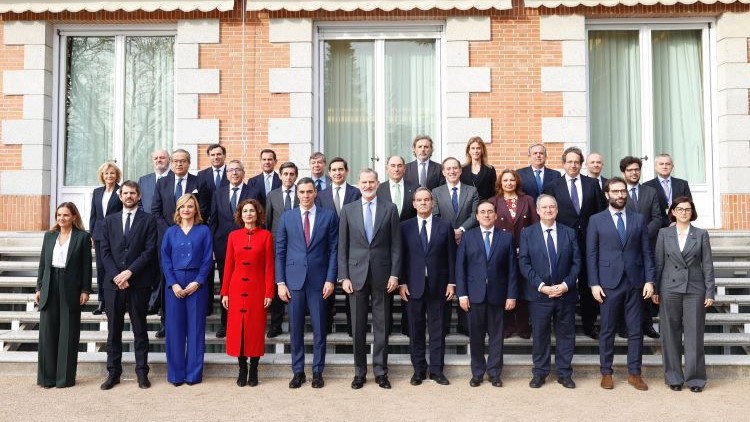The Diplomat
Yesterday, the Zarzuela Palace hosted the XXXIV ordinary session of the Board of Trustees of the Carolina Foundation, which was chaired by King Felipe VI and in which the Action Plan for the year 2024 was approved, whose main objectives will once again be higher education, scientific cooperation and public diplomacy.
The event was attended by the President of the Government and executive president of the Board of Trustees, Pedro Sánchez; the first vice president and Minister of Finance, María Jesús Montero; and the Minister of Foreign Affairs, José Manuel Albares.
Also attending were the Minister of Education and Vocational Training and Sports, Pilar Alegría; the Minister of Industry and Tourism, Jordi Hereu; the Minister of Culture, Ernest Urtasun; the Minister of Economy, Commerce and Business, Carlos Body; the Secretary of State for Ibero-America and the Caribbean and Spanish in the World, Susana Sumelzo; the Secretary of State for International Cooperation, Eva Granados; the director of the Spanish Agency for International Development Cooperation, Antón Leis; the director of Cultural and Scientific Relations of the Spanish Agency for International Development Cooperation, Santiago Herrero; and the Ibero-American Secretary General, Andrés Allamand.
Among the representatives of the sponsoring companies were the president of BBVA, Carlos Torres Vila; the president of Iberdrola, Ignacio Sánchez Galán; the president of Telefónica, José María Álvarez-Pallete López; the vice president of Grupo Prisa, Fernando Carrillo; the president of MAPFRE, Antonio Huertas; the president of El Corte Inglés, Marta Álvarez; the president of ICO, José Carlos García de Quevedo Ruiz; the president of Havas Media Group Spain, Alfonso Rodés Vilà; the Global Head of Human Resources of Banco Santander, Alexandra Brandâo; the director and vice president of the Repsol Foundation, Antonio Calçada; the general director of Madrid Agua España, Federico Ramos; the general director of CECA, José María Méndez; the CEO of Inditex, Óscar García Maceiras; and the president of the Abertis Private Foundation, Elena Salgado.
During the session, the Action Plan for the year 2024 of the Foundation was approved, which presents a postgraduate and doctoral training call for 669 scholarships in all areas of knowledge and which continues to maintain its agreement with the Sustainable Development Goals of the Agenda 2030, as reported by the Carolina Foundation in a press release. As a novelty, it incorporates a relevant program with the CSIC, which offers ten scholarships for stays in centers of this entity in Spain and another ten for research centers in Latin America. During the Board of Trustees, the Annual Accounts of the institution corresponding to the financial year 2022 were also approved.
In accordance with the adopted Action Plan, in 2024 the Carolina Foundation will intensify the development of its most representative programs (higher education, scientific cooperation and public diplomacy), activating initiatives that expand the collection of its research through a new “portal of the knowledge”, and that they promote their professional networks by energizing the “Carolina Associations” in Latin America. In addition, the celebration of the twentieth anniversary of the Colombian branch of the Foundation will occupy a prominent place in the annual program.
During the session, the President of the Government thanked the Carolina Foundation for its work in supporting the recently concluded Spanish Presidency of the Council of the European Union, providing inputs of “great value” for the strengthening of Euro-Latin American relations and the renewal of the political and bi-regional cooperation agenda. For his part, Minister Albares highlighted the contributions of the Foundation to the preparation of the new Law on Cooperation for Sustainable Development and Global Solidarity and the support that the institution provides in the reform process of the Spanish Cooperation system.
The director of the Carolina Foundation, José Antonio Sanahuja, advanced the main activities of the Action Plan and highlighted the institution’s will to continue contributing to the international relevance of Ibero-American cooperation, and the role that education, knowledge and , civil society and public and private agents.







